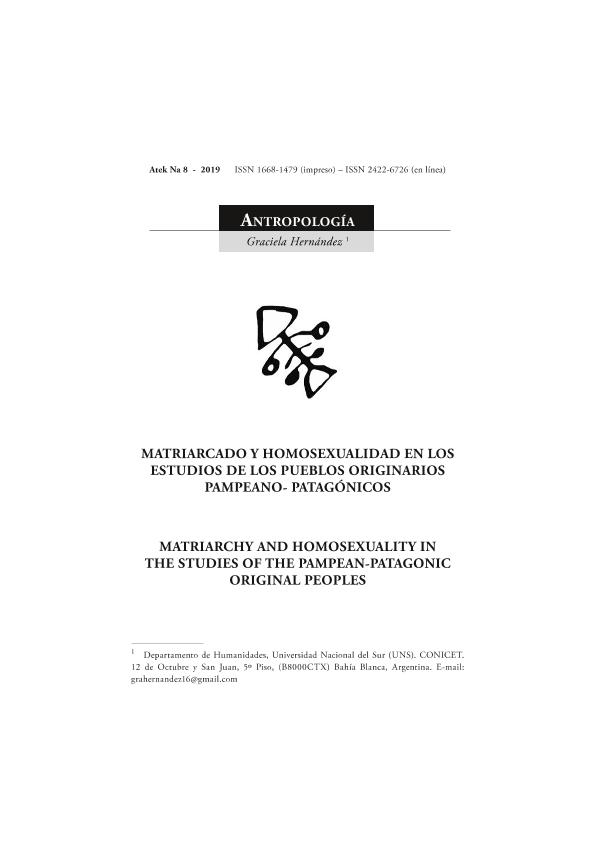Artículo
El objetivo principal del trabajo es puntualizar desde perspectivas teórico y epistemológicas feministas en los posibles significados del concepto de matriarcado en el estudio de los pueblos originarios pampeano-patagónicos. Realizamos este trabajo a partir del análisis del epígrafe reproducido por la Revista Legado (2017), en la sección Misceláneas, de una imagen en la que se describe a la persona fotografiada como: tehuelche, chamán, travesti y se infiere que su condición es un indicador que da cuenta de su pertenencia a una cultura matriarcal. Este material fue extraído del Fondo Caras y Caretas y nosotros queremos ahondar en los entramados teóricos que encierra la afirmación. Realizamos una revisión del vínculo entre matriarcado ?también llamado derecho materno- y travestismo -considerado sinónimo de homosexualidad- en las líneas evolucionistas y difusionistas que estudiaron a las culturas de los pueblos originarios pampeano-patagónicos, incluyendo la producción científica realizada en Chile. Ambas tradiciones -difusionismo y evolucionismo-, a pesar de sus diferencias, encontraron en el pasado una etapa de matriarcado o de derecho materno. El difusionismo estudió estas cuestiones en los rituales, y relacionó matriarcado a homosexualidad. El evolucionismo encontró indicadores del matriarcado en los estudios del parentesco. A través de todo el recorrido de investigación inferimos que el texto referenciado se encuentra dentro del paradigma de la Escuela Difusionista Alemana, una teoría con pretensiones de universalidad, que también buscó verificar sus postulados con indicadores culturales de los pueblos originarios pampeano-patagónicos. The main objective of the work is to point out from feminist theoretical and epistemological perspectives on the possible meanings of the concept of matriarchy in the study of the PampeanPatagonian native peoples. We made this work from the analysis of the section reproduced by the Revista Legado –Legacy Magazine– (2017), in the Miscellaneous section, of an image in which the photographed person is described as: tehuelche, shaman, transvestite and it is inferred that his condition is a an indicator that gives an account of their belonging to a matriarchal culture. This material was extracted from the Caras y Caretas Fund and we want to delve into the theoretical frameworks that enclose the affirmation. We review the relationship between matriarchy -also called maternal rightand transvestism -considered synonymous with homosexuality- in the evolutionist and diffusionist lines that studied the cultures of the original Pampeano-Patagonian peoples, including the scientific production carried out in Chile. Both traditions -difusionism and evolutionism-, in spite of their differences, found in the past a stage of matriarchy or maternal right. Diffusionism studied these issues in rituals, and related matriarchy to homosexuality. Evolutionism found indicators of matriarchy in kinship studies. Throughout the course of research we infer that the referenced text is within the paradigm of the German Diffusionist School, a theory with claims of universality, which also sought to verify its postulates with cultural indicators of the original Pampeano-Patagonian peoples.
Matriarcado y homosexualidad en el estudios de los pueblos originarios de la región pampeano-patagonico.
Título:
Matriarchy and homosexuality in the studies of the pampean-patagonic*- original peoples
Fecha de publicación:
12/2019
Editorial:
Universidad Nacional de Luján
Revista:
Atek Na
ISSN:
1668-1479
e-ISSN:
2422-6726
Idioma:
Español
Tipo de recurso:
Artículo publicado
Clasificación temática:
Resumen
Archivos asociados
Licencia
Identificadores
Colecciones
Articulos(CCT - BAHIA BLANCA)
Articulos de CTRO.CIENTIFICO TECNOL.CONICET - BAHIA BLANCA
Articulos de CTRO.CIENTIFICO TECNOL.CONICET - BAHIA BLANCA
Citación
Hernandez, Graciela Beatriz; Matriarcado y homosexualidad en el estudios de los pueblos originarios de la región pampeano-patagonico.; Universidad Nacional de Luján; Atek Na; 8; 12-2019; 95-128
Compartir




